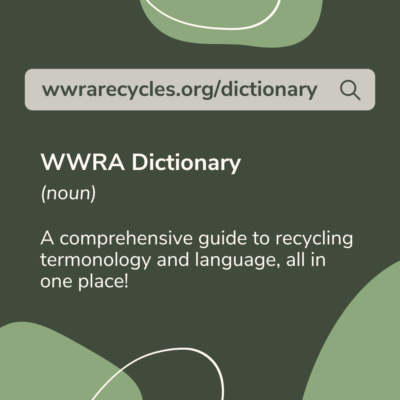Recycling Dictionary
We’re compiling common recycling terminology into an all-encompassing WWRA Recycling Dictionary! Use this as a comprehensive guide to understand your recycling.
Bale: A compacted block of recyclables created by an MRF. These blocks are created after recycling has been collected and sorted by type. Baling recycling allows the WWRA to transport recyclables to recycling facilities more efficiently.
Bioplastics: Plastic alternatives made from renewable resources. These products often have labels saying “100% compostable,” “100% biodegradable,” or even “Reduce, reuse, recycle”. These items may be compostable in some circumstances, but they are NOT recyclable. If you see common bioplastics, like “compostable” cups, plates, to-go containers, and utensils, remember these are industrial compost only. These items are often made from sugarcane, oil waste, or waste pulp and are not able to be recycled into new plastic products. These items may have deceptive recycling labels, such as saying “Reduce, reuse, recycle,” but are not recyclable at the WWRA.
Home Toxics: Household products that can catch fire, react, corrode, or explode under certain circumstances. This includes paint products, cleaners, oils, batteries, and pesticides. These are NOT RECYCLABLE. When disposing of home toxics, special care is required to reduce risk for your family, environment, and community.
Illegal Dumping: When someone dumps unrecyclable items in or outside of the WWRA’s recycling bins. Common items include furniture, construction waste, tanglers, and foam. This can be done by someone who hopes other bin users will take the items or by someone who does not want to dispose of waste correctly. Leaving these items and any trash in or by bins is illegal and may be subject to a $1,000 fine.
MRF: Materials Recovery Facility. A specialized facility tasked with collecting, sorting, and baling household recyclables to send them to recycling facilities. The WWRA is a Materials Recovery Facility (MRF) was created in cooperation with five local municipalities to collect western Washtenaw’s household recyclables. We collect, sort, and bale household recyclables which are sold to specialized recycling facilities such as Graphic Packaging (Kalamazoo, MI), Clean Tech (Dundee, MI), and Strategic Material (Chicago, IL).
Recyclable: Products that are able to be recycled. Many have labels such as “Recycle Me” and “Curbside Recyclable (Check Locally).” Not all items carrying these labels are recyclable. To determine if your item is recyclable, check out our website. You can also look for a How2Recycle Label on the back.
Recyclability: The ability to collect, sort, and process a material to be made into new products. Recyclability composes many aspects, such as material quality, cost, ease, and access to recycling centers. You can increase a product’s recyclability by rinsing all product residue off packaging, only recycling accepted items, and not bagging your recyclables.
Recycled: Products that have been recycled already and are made with recycled materials. Products may advertise that they were made with “100% Recycled Materials,” “Post Consumer Recycled Materials,” or “100% Recycled and Recyclable Packaging.” Just because a product was made with recycled materials doesn’t mean it is recyclable. It just shows the product’s history.
Resin Code: Also know as the plastic recycling number, resin codes show the type of plastic used to produce the item. Plastic containers #1 – #7 are recyclable at the WWRA.
Tanglers: Nonrecycable items, including hoses, plastic bags, rope, string, chains, and Christmas lights that become tangled in our recycling machines. These items lead to costly repairs and wasted time. Remember: tanglers are NOT recyclable at the WWRA.
Tempered Glass: Glass that has been heat treated to withstand higher temperatures and impact. When tempered glass breaks, it completely shatters instead of creating large splinters. Tempered glass is not recyclable at the WWRA. Examples of nonrecyclable tempered glass include candle jars, Pyrex or casserole dishes, glass tabletops, windows, glass cutting boards or appliance dishes (microwaves), and shower doors.
Terracycle: An alternative recycling company with the goal of “Eliminating the Idea of Waste”. TerraCycle works with businesses and organizations to create takeback programs for unrecyclable items. Using specialized technology, TerraCycle is able to salvage materials that would otherwise be thrown away. It is important to remember that TerraCycle is not associated with local MRF’s like the WWRA and has different rules and regulations. Do NOT recycle these items at the WWRA.
TetraPak: A type of drink packaging commonly used for broths, juices, and plant based milks. TetraPaks are recyclable at the WWRA: just rinse out all products and replace the cap! TetraPaks are a great solution that replaces plastic lined cardboards that are not recyclable. Examples of these include disposable coffee cups: do not recycle these!
Thin Plastics: Nonrecyclable flexible plastics, such as grocery or trash bags, bubble wrap, shrink wrap, snack bags, and other items. These plastics are often used in food packaging or shipping. No thin plastics are recyclable, and they should not be placed in recycling bins or used to bag recyclables.
Upcycle: The process of reusing materials from an existing product in a new product to serve a more useful purpose. As opposed to downcycling, which reduces the usefulness of a product, upcycling can help these materials last longer out of a landfill.
Virgin Materials: Virgin materials, or new materials, have been directly extracted from the earth and contain no recycled materials. Creating virgin materials removes precious resources from the earth. When you purchase “post consumer” products or “100% recycled” products, you are both diverting waste from landfills and preventing more resource loss. Recycled materials are less pollutive, use less materials, and are cost effective. Make sure you recycle these materials to continue the loop!
Wishcycling: Recycling an item when you are unsure of if it can be recycled. Many participate in wishcycling because they believe it is better to attempt to recycle an item than just throw it in the trash. No matter what the cause of wishcycling is, contaminates entering our facility costs time and money.

